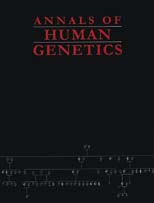Article contents
Testing the equality of twin correlations with multinomial outcomes
Published online by Cambridge University Press: 01 July 1999
Abstract
Twin studies are widely used to study genetic and environmental influences on human measurements. Correlations are often used in such studies to compare the levels of similarity between monozygotic and dizygotic twins with respect to a specified trait. In this paper, we compare three procedures for testing the equality of twin correlations when the outcome variable of interest is multinominal. One method is a likelihood ratio test based on an underlying Dirichlet-multinomial distribution. The second method is based on the estimated large sample variance of the estimated correlation, and the third method is based on a χ2 goodness-of-fit test. The results of a Monte Carlo simulation show that the three methods have similar properties if the number of twin pairs is large (> 100), and the prevalence of the underlying trait is not extreme. Otherwise, the goodness-of-fit approach is to be preferred. We illustrate the methods by analyzing data from a previously published smoking study.
- Type
- Research Article
- Information
- Copyright
- © University College London 1999
- 6
- Cited by




